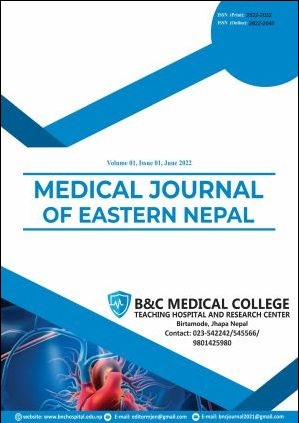Assessing the Level of Knowledge and Practice regarding Blood transfusion and Its Complications among Staff Nurses working at B & C Teaching Hospital and Purbanchal Cancer Hospital, Birtamode, Jhapa, Nepal
DOI:
https://doi.org/10.3126/mjen.v1i1.45859Keywords:
Blood Transfusion, Practice, NursesAbstract
Background: Blood transfusion is a liquid transplant. Nurses are having more responsibility in many aspects of the transfusion process such as taking and labeling blood samples, collection of blood from the blood bank, short term storage in ward areas, checking, administering, documenting transfusion process and monitoring of the patient, it is vital that they are through and methodical in all task related to transfusion to ensure patients safety and must be aware of the steps necessary at each stage to safe guard the patient. Nurses are responsible not only for the actual administration of the blood product and monitoring of the patient during its administration but they also need to efficiently identify and manage any potential transfusion reactions. It is important to remember that transfusion reactions can occur during the actual blood transfusion as well as for days and weeks following the administration of the blood product. Although blood transfusion reactions are rare, it is important that any nurse who administers a blood product be aware of potential reactions and knows how to manage these reactions safely and effectively.
Methods: This is a descriptive study to assess the knowledge and practice regarding blood transfusion and its complications.
Results: Forty-four percent (44%) of the nurses had obtained Proficiency Certificate Level (PCL) Nursing and Health Assistant (HA) degree qualification. Forty percent (40%) of the nurses had one year of experience. Forty percent of the nurses worked in general ward at the hospital. Almost 80% of the nurses (79%) of the nurses stated that they attended Continuing Nursing Education regarding blood transfusion. 59% of total respondents have adequate knowledge.
Conclusions: Continuous Nursing Education for the improvement of nurses’ knowledge and skills as well as routine monitoring should be carried out to ensure safe practice in blood transfusion.
Downloads
Downloads
Published
How to Cite
Issue
Section
License
Copyright (c) 2022 B & C Medical College and Teaching Hospital and Research Centre

This work is licensed under a Creative Commons Attribution-NonCommercial 4.0 International License.
CC BY: This license allows reusers to distribute, remix, adapt, and build upon the material in any medium or format, so long as attribution is given to the creator. The license allows for commercial use.




